The closure activity of the noncompetitive pit coal mines receives this year 143.4 million lei (32.3 million Euros), headlines Mediafax. The mines belong to the National Company for Mine Closures Valea Jiului S.A. Petroșani. The amount comes entirely from the state budget, through the budget of the Ministry of Energy, Small and Medium Enterprises and Business Sector.
The National Coal Company (CNH) Petroșani has seven coal production units: Lonea, Petrila, Livezeni, Vulcan, Paroşeni, Lupeni and Uricani. The mines considered uncompetitive within CNH are Petrila, Paroşeni and Uricani. The deadline for closure is 2018, recalled Mediafax. The Lonea, Livezeni, Vulcan and Lupeni mines were included in 2012 in the company Complexul Energetic Hunedoara, along with Deva and Paroşeni power plants.
For the energetic pit coal delivered by mines in final closure process 93.3 million lei will be allocated to cover losses on current production and for the units that entered the final closing process 50.1 million lei will be allocated, to bear the exceptional costs unrelated to the current production. 25.8 million lei will be allocated for compensation, while for the closure works 24.3 million lei will be used. Regarding facilities for the pensioners and the retraining of employees no funds were allocated.
The European Commission has authorized Romania, in 2012, to grant aid from public funds of 1.17 billion lei (about 270 million Euros), for the closure of uncompetitive coal mines from three units owned by CNH for the period 2011-2018. In November 2012 the National Company for Mine Closures Valea Jiului Petroșani was founded, which manages the money for the closure of the noncompetitive coal mines.
The Ministry of Energy, Small and Medium Enterprises and Business Sector is responsible for monitoring the level of state aid, so that the price of coal delivered by the aided production units may not be less than the prices of coal of similar quality from third party countries.
